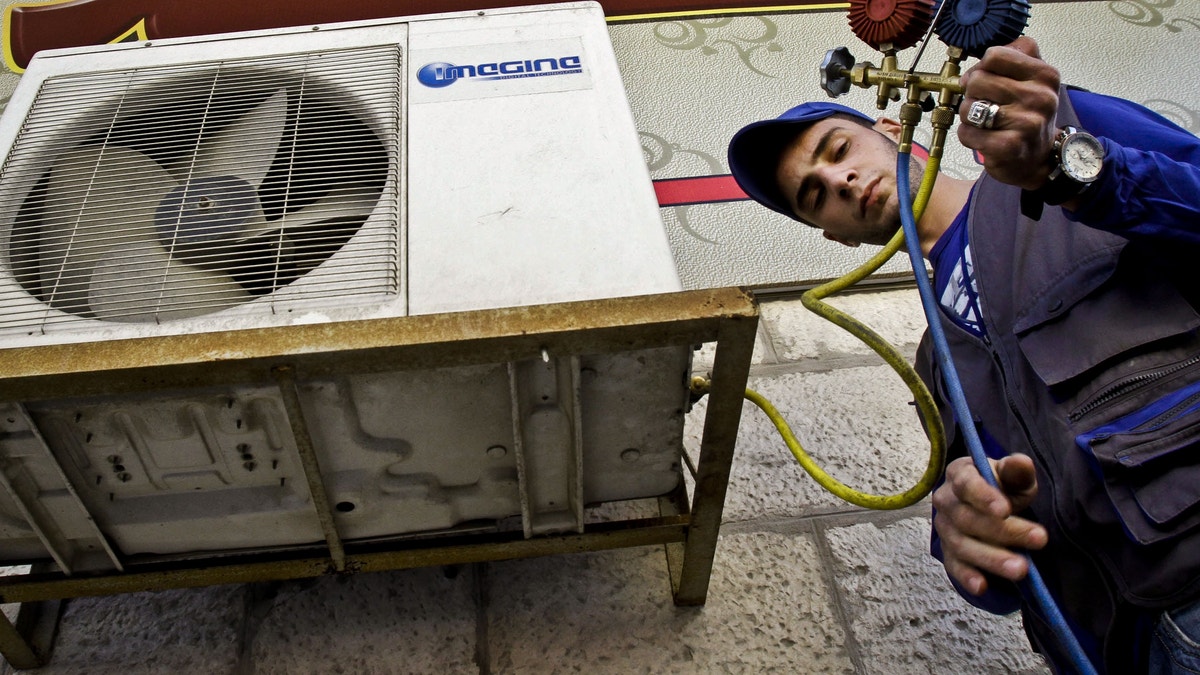
Mohammed Nabouti, a 21-year-old technician, fixes the air conditioner of a shop in Amman, Jordan on Monday, March 4, 2013. Just six months of learning to fix air conditioners changed Nabouti's life. Instead of drifting after high school like many of his jobless friends, Nabouti has taken a small loan to start his own business and recently got engaged. Nabouti's story points to a quick fix the unemployment-stricken Middle East might try until deeper economic reforms can kick in, experts say. This quick fix includes job training, micro loans and help in setting up businesses. (AP Photo/Raad Adayleh) (The Associated Press)
AMMAN, Jordan – Just six months of learning to mend air conditioners changed Mohammed Nabouti's life.
Instead of drifting after high school like many of his jobless friends, the 21-year-old Jordanian works steadily, has taken a small loan to start his own business and recently got engaged.
Nabouti's story points to a fix the unemployment-stricken Middle East might try until deeper economic reforms can kick in, experts say -- job training, micro loans and help in setting up businesses.
One cause of high youth unemployment in the Middle East is the gap between the skills employers need and the skills being taught in schools and universities.
In Jordan, Egypt, Tunisia, Iraq and elsewhere, the government has long been the largest employer, offering better wages and job security than the underdeveloped private sectors. The universities served to feed the civil service, with an emphasis on certificates rather than specific skills, while those with a high school education or less became shopkeepers or laborers.
But a population explosion resulted in too many competitors for too few civil service jobs, and not enough skilled workers, said Mayyada Abu Jaber, head of the Jordan Career Education Foundation. Each year, Jordan produces about 40,000 college graduates, while 60,000 high school dropouts compete for unskilled jobs.
Abu Jaber's center offers the dropouts training in what the private sector needs __ courses in land surveying, hospitality, air conditioner repair and information technology. Up to 1,500 young Jordanians complete the classes every year, she said, adding that "the private sector is really waiting for those graduates."
After graduating in 2011, Nabouti got a government loan of 2,000 dinars ($2,800) to rent a van. He makes 800 dinars ($1,100) a month fixing air conditioners, double a laborer's wage, and says his prospects are better than a college graduate's.
For many others without jobs, especially college graduates and professionals, emigration is the only option, and every sixth Jordanian works in one of the oil-rich Gulf countries.
The Arab Spring protests have forced Arab governments to get serious about economic reform, said Tarik Yousef of Silatech, a Qatar-based foundation that helps set up micro-finance and job training programs for young people.
"The biggest obstacle in the past 20 years was even thinking about comprehensive reform," he said. "We can at least imagine now and plan for this discussion to take place. Two years ago, I was in complete despair and had given up on the possibility of change."
Across the board, economists offer similar prescriptions for job creation: Fewer bureaucrats, less red tape hampering private business, a more flexible labor market, more teaching of skills, and large, job-intensive infrastructure projects.
But two years of uprisings have worsened Arab economies, making it harder to jumpstart reform. Instead of cutting payrolls, Egypt and Tunisia, for instance, are trying to ease unemployment by hiring still more civil servants.
A more basic problem is deciding what sort of economy works best in the Middle East, says Masood Ahmed of the International Monetary Fund.
Eastern Europe used Western Europe as a yardstick after the fall of communism, he said. "In the Arab world, there is no single role model."
